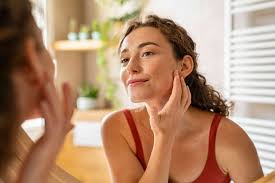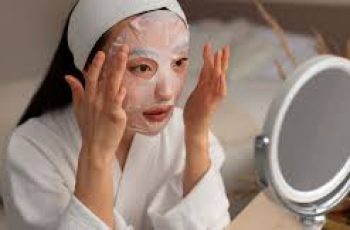
Could Omega-3s and the Mediterranean Diet Be the Key to Clearer Skin?
A new study found that consuming an omega-3 supplement and following the Mediterranean diet could improve acne.
Both omega-3s and the Mediterranean diet reduce inflammation and regulate hormones associated with acne, targeting the root causes of the condition.
More research is needed to establish a causal effect, but the results show that dietary interventions could help manage acne beyond just prescription drugs, researchers said.
Sticking to a certain diet and supplement routine may be able to boost a person’s skin health, according to new research.
A study published on July 10 in the Journal of Cosmetic Dermatology found that people with mild-to-moderate acne saw their symptoms improve after they took an omega-3 supplement and followed the Mediterranean diet.1
Over the course of 16 weeks, researchers in Germany followed 58 women and two men, who were, on average, 26 years old. At the beginning of the study, about 98% of the participants were deficient in omega-3. None of them were taking prescription drugs to manage acne.
The researchers’ goal was to see if diet could be a key contributor to participants’ acne, since processed foods, refined sugars, saturated fats, cow’s milk, and dairy products have been tied to the development of acne.1 They hoped to investigate whether people could improve their acne if they reduced their consumption of some of these foods while also increasing intake of fatty acids.
To this end, participants followed the Mediterranean diet and took an oral algae-derived omega-3 supplement. They met with researchers four times over the course of the study.
In the end, 42 of the 60 patients said the changes improved the severity of their acne, and researchers noted significant reductions in the number of inflammatory and non-inflammatory lesions. And overall, the participants’ omega-3 levels went up.1
The results of the study show that dietary interventions could be a useful tool for managing acne beyond just prescription drugs.1
“Lifestyle interventions, including dietary recommendations, should not be considered in opposition to prescription medications, but rather as a valuable adjunct to any modern acne treatment plan,” study author Anne Guertler, MD, a dermatologist and researcher at Ludwig Maximilian University of Munich, said in a press release.2
Here’s what experts had to say about the connection between the Mediterranean diet, omega-3s, and acne, plus what to know before you start tweaking your diet in the name of skin health.
Why Diet and Omega-3 Consumption Can Affect Your Skin
Acne is an inflammatory skin condition that occurs “due to increased oil production from hormonal changes, clogged pores from dead skin cells, and inflammation caused by the bacteria Cutibacterium acnes,” Victoria Billero, MD, dermatologist and assistant professor at Tufts University School of Medicine, told Health.
Essentially, hair follicles become clogged with oil and skin cells, leading to blockages or pimples.3
There are a number of factors that can make someone more prone to acne, including “hormones, stress, lifestyle, microbiome, and immune function,” Dendy Engleman, MD, a board-certified dermatologic surgeon at Shafer Clinic Fifth Avenue, told Health.
However, what you eat can also impact acne—specifically, certain foods can exacerbate the condition, including dairy products or high-glycemic foods, which spike blood sugar.45
“Some foods may contribute to acne by influencing oil production and microbiome health,” Engleman said. “On the other hand, a diet rich in nutrients can support overall skin health.”
This is why the Mediterranean diet could be beneficial for people with acne—many of the foods in the diet, such as vegetables and nuts, tend to have a low glycemic index, plus the diet has anti-inflammatory properties.
What Is the Mediterranean Diet?
The Mediterranean diet is based on the traditional eating habits of countries bordering the Mediterranean Sea. It usually includes a high intake of vegetables, fruits, nuts, legumes, and olive oil, a moderate intake of fish, meat, and dairy products, and a low intake of sweets. The diet has been associated with a lower risk of cancer, heart disease, and cognitive issues.6
“The diet emphasizes whole foods, rich in nutrients that support skin health, while limiting processed foods,” Engelman said. “The diet’s focus on fruits, vegetables, whole grains, fish, and healthy fats can also potentially reduce inflammation and regulate hormones associated with acne, targeting many of the key root causes of the condition.”
The Mediterranean diet is also high in fatty acids such as omega-3, which previous research has linked to improvements in acne and other skin conditions.789
“Omega-3s have anti-inflammatory properties, which can help reduce inflammation associated with acne,” said Engleman. “Having a diet low in omega-3s may contribute to acne because a deficiency can result in higher levels of inflammation and an imbalance in the skin’s oil production.”
Using Food to Take Care of Your Skin
Despite the study’s findings, more research is needed to determine how omega-3s and the Mediterranean diet affect acne. With the way the study was designed, it’s not clear whether it was dietary changes, increases in omega-3 levels, or some other factor that specifically caused participants’ acne to improve.1
The study had other limitations as well; the cohort was overwhelmingly female and relatively small, plus researchers relied on surveys to assess participants’ dietary habits, which opens up the door for recall bias.1
It’s too soon to definitively say that increasing omega-3 intake and sticking to the Mediterranean diet can clear up your acne. But making these dietary changes can still be helpful for reducing inflammation and boosting health more generally, in addition to the potential for improved skin.1
“It is important that individuals focus on a balanced diet consisting of nutrient-rich foods if they are looking to improve their skin health,” Engelman said.
In particular, the following steps could be helpful in improving acne and overall health, she added:
Increasing intake of fruits, vegetables, and whole grains for antioxidants and fiber
Adding healthy fats—especially omega-3s from sources such as fish, nuts, and seeds—into your diet
Staying hydrated
Limiting consumption of highly processed or sugary foods or beverages
Eating low-glycemic foods to help regulate blood sugar
According to Billero, choosing foods that will stabilize blood sugar levels is one of the best ways to see acne improvements.
“I tell my patients with acne that one thing they can do to help their skin through diet is to pair their carbohydrates with a healthy fat like avocado, fish, olive oil, nuts, or seeds,” she explained. “These healthy fats slow digestion so the sugars aren’t absorbed too quickly into the bloodstream, altering hormone levels.”
But if dietary changes or over-the-counter treatments for acne aren’t working, it’s worth seeing a dermatologist to discuss other options, experts said.
“There are other factors at play in acne, including genetics, environmental exposures, and some medications, so focusing on diet alone may not be enough for some people,” Billero explained.


